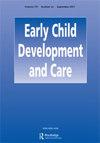Borderline personality disorder in mothers, maternal sensitivity, and infant social withdrawal: a study on clinical dyads referred to perinatal mental health units
IF 0.8
4区 心理学
Q3 EDUCATION & EDUCATIONAL RESEARCH
引用次数: 0
Abstract
ABSTRACTBehavioural, cognitive and emotional dysregulation related to parent borderline personality disorder (BPD) may have a major impact on parent–infant interactions. We investigated the ways in which infant social withdrawal and mother sensitivity may be associated to a BPD diagnosis in mothers. Two groups of clinic-referred mother–infant dyads were set up: one in which consulting mothers were diagnosed with BPD. Infant social withdrawal and maternal sensitivity were assessed during free-play interactions videotaped within a clinical setting. Mothers with BPD showed lower maternal sensitivity, while their infants displayed higher levels of social withdrawal behaviour when compared to dyads with no maternal psychiatric diagnosis. Infants of mothers with BPD appear at particular risk of adverse developmental outcomes from their very first months of life. Early interventions should concentrate on improving maternal interpretation and response to infant cues, such as identifying nonverbal behaviours and regulating the infant’s emotional states, and on promoting mentalization.KEYWORDS: Borderline personality disorderearly interactionmaternal sensitivityinfant social withdrawal Disclosure statementNo potential conflict of interest was reported by the author(s).Additional informationNotes on contributorsJaqueline WendlandJaqueline Wendland, Full Professor of infant and perinatal clinical psychology and psychopathology at the Institute of Psychology, Université Paris Cité, Paris, France. She works as a clinical psychologist and supervisor at the Vivaldi Parent-Infant Mental Health Unit at the Pitié-Salpêtrière University Hospital in Paris. Her research focuses mainly on the parenting process in its typical and atypical aspects, particularly in situations where the parent-child interactions are exposed to psychopathological, psychosocial and/or somatic risk factors.Charlotte CastelnauCharlotte Castelnau is a clinical psychologist trained in attachment and parenting. She works in childcare centres in Noisy le Roi and Guyancourt, France.Alexandra DéprezAlexandra Déprez is Doctor of Psychology, head of the b-families consultation, training and expertise center, in Luxemburg.Didier RabainDidier Rabain is a child and adolescent psychiatrist, specialized in perinatal psychopathology. He is the former head of the Vivaldi Parent-Infant and Parenthood Unit, Pitié-Salpêtrière University Hospital, in Paris, France.Claire de CarmantrandClaire de Carmantrand is a child and adolescent psychiatrist. She is the head of the COLIBRI Parent-Infant Unit, Plaisir Hospital, in Saint-Cyr l'Ecole, France.Antoine GuédeneyAntoine Guédeney is Professor Emeritus of child and adolescent psychiatry at Université Paris Cité. He si the former head of the Department of child and adolescent psychiatry, Bichat University Hospital, in Paris, France.母亲的边缘型人格障碍、母亲的敏感性和婴儿的社交退缩:一项关于围产期精神卫生单位的临床双性恋的研究
父母边缘型人格障碍(BPD)相关的行为、认知和情绪失调可能对亲子互动产生重大影响。我们调查了婴儿社交退缩和母亲敏感性可能与母亲BPD诊断相关的方式。两组临床转诊的母婴组被设置:一组咨询母亲被诊断患有BPD。在临床环境中,对婴儿的社交退缩和母亲的敏感性进行了评估。患有BPD的母亲表现出较低的母性敏感性,而她们的婴儿则表现出较高的社交退缩行为。患有BPD的母亲所生的婴儿在出生后的头几个月出现不良发育结果的风险特别大。早期干预应侧重于改善母亲对婴儿线索的解释和反应,如识别非语言行为和调节婴儿的情绪状态,并促进心理化。关键词:边缘型人格障碍早期互动母亲敏感性婴儿社交退缩披露声明作者未报告潜在的利益冲突。作者简介:jaqueline Wendland,法国巴黎城市大学心理研究所婴儿和围产期临床心理学和精神病理学全职教授。她是巴黎Pitié-Salpêtrière大学医院维瓦尔第亲子精神健康部门的临床心理学家和主管。她的研究主要集中在养育过程的典型和非典型方面,特别是在亲子互动暴露于精神病理、社会心理和/或躯体风险因素的情况下。Charlotte Castelnau是一名临床心理学家,接受过依恋和育儿方面的培训。她在法国Noisy le Roi和Guyancourt的托儿中心工作。Alexandra d录影带是心理学博士,也是卢森堡b家庭咨询、培训和专家中心的负责人。Didier Rabain是一名儿童和青少年精神病学家,专门研究围产期精神病理学。他是法国巴黎Pitié-Salpêtrière大学医院维瓦尔第亲子和亲子科的前主任。Claire de Carmantrand是一名儿童和青少年精神病学家。她是法国圣西尔大学Plaisir医院COLIBRI亲子部的负责人。Antoine gusamdeney是巴黎城市大学儿童和青少年精神病学荣誉教授。他是法国巴黎比夏大学医院儿童和青少年精神科的前主任。
本文章由计算机程序翻译,如有差异,请以英文原文为准。
求助全文
约1分钟内获得全文
求助全文

 求助内容:
求助内容: 应助结果提醒方式:
应助结果提醒方式:


